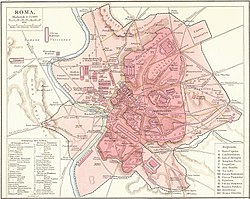Nostra Signora del Sacro Cuore
This article needs additional citations for verification. (April 2015) |
| Nostra Signora del Sacro Cuore | |
|---|---|
| Church of Our Lady of the Sacred Heart | |
| San Giacomo degli Spagnoli, Santiago de los Españoles | |
Chiesa di Nostra Signora del Sacro Cuore | |
 The façade of Nostra Signora del Sacro Cuore as seen from Piazza Navona. | |
 Nostra Signora del Sacro Cuore | |
| 41°53′53.73″N 12°28′24.70″E / 41.8982583°N 12.4735278°ECoordinates: 41°53′53.73″N 12°28′24.70″E / 41.8982583°N 12.4735278°E | |
| Location | Corso del Rinascimento 27, Rome |
| Country | Italy |
| Language(s) | Italian, Spanish |
| Denomination | Catholic |
| Tradition | Roman Rite |
| Website | nostrasignoradelsacrocuore |
| History | |
| Status | titular church, national church |
| Founded | 12th century |
| Dedication | Mary, mother of Jesus and the Sacred Heart |
| Architecture | |
| Architectural type | Renaissance |
| Completed | 1938 |
| Administration | |
| Diocese | Rome |
Nostra Signora del Sacro Cuore ("Our Lady of the Sacred Heart", also known as San Giacomo degli Spagnoli and in Spanish, Santiago de los Españoles) is a Catholic church dedicated to the Virgin Mary located in Rome's Piazza Navona.
History[]
An earlier church had been erected in the same place, on the ruins of the Stadium of Domitian, in the 12th century. The first mention of this church is in the will of Henry of Castile (1230-1304), son of King Ferdinand III of Castile, who had given money to build it in 1259. The new edifice was built for the Holy Year of 1450 using a gift from Alfonso de Paradinas. The façade, once facing the opposite side than now, was designed by Bernardo Rossellino. Pope Alexander VI, of Spanish origin, later had a square carved out in front of it.
Starting in 1506 the church was the national church of the Spanish community in Rome. When Santa Maria in Monserrato degli Spagnoli was completed in the 17th century, the focus of the community shifted to that church, which is now the Spanish national church.
Pope Leo XIII had the edifice, which was on the verge of crumbling down, extensively renovated in the late 19th century. At that time the main entrance was moved to face Piazza Navona. The apse and the transept were demolished in 1938 to open the current Corso del Rinascimento avenue.
Interior[]

Most of the works of art and funerary monuments in the church were transferred to Santa Maria in Monserrato. What remains in the church are some Renaissance works, such as a chancel in polychrome marble and the marble backdrop behind the high altar. The altarpiece of the Assumption of the Virgin with Glory of Angels and Apostles was made by Flemish-born painter Francisco de Castello. The Cappella di San Giacomo is also intact. Some of the paintings of the Herrera Chapel were transferred to Museu Nacional d'Art de Catalunya in Barcelona and some to Museo del Prado[1]
Notes[]
References[]
| Wikimedia Commons has media related to Nostra Signora del Sacro Cuore (Rome). |
Text retrieved from romanchurches.wikia.com
- Roman Catholic churches completed in 1450
- 15th-century Roman Catholic church buildings in Italy
- Titular churches
- Churches of Rome (rione Parione)

